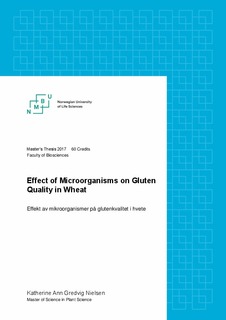Effect of microoganisms on gluten quality in wheat
Master thesis
Permanent lenke
http://hdl.handle.net/11250/2449182Utgivelsesdato
2017Metadata
Vis full innførselSamlinger
- Master's theses (IPV) [240]
Sammendrag
Food security is a current issue of both domestic and international concern. Faced with a growing population and the increased food demands it entails, the Norwegian government has recently renewed its commitment to increase food production nationally. In accordance, efforts are being made in Norwegian wheat production, but there are challenges to overcome. Fluctuation in gluten content and functionality in Norwegian-grown wheat in recent years has created economic and practical difficulties for the bread baking industry. Studies of samples of wheat with poor baking quality have found possible links to microorganisms, particularly Fusarium ssp., and environmental conditions conducive to their growth. As part of the “Quality Wheat” project started in 2014, this study aims to elucidate possible connections between microorganisms and reduced baking quality in wheat. A greenhouse inoculation experiment with wheat and microorganisms and a media experiment testing microorganisms’ ability to use gluten as a nitrogen source facilitated exploration of this topic.
In the greenhouse inoculation experiment, spring wheat was inoculated with Fusarium avenaceum, Fusarium graminearum, Microdochium majus, and Luteibacter rhizovicinus. Harvested grain from wheat inoculated with F. graminearum and F. avenaceum exhibited symptoms of infection and was found to contain fungal DNA. Analysis of flour made from the same material also revealed protease activity on gluten and gelatin substrates in samples of wheat inoculated with F. graminearum and F. avenaceum. When baking quality of the flour from this experiment was analyzed, it was found that flour from wheat severely infected with F. graminearum contained a reduced proportion of unextractable polymeric proteins (%UPP) known to confer dough with its elastic strength. This was accompanied by a reduction in measured maximum resistance to stretching (RMAX) when using the same flour for analysis. In flour made from wheat inoculated with F. graminearum in this study, F. graminearum DNA content was found to be significantly negatively correlated to both %UPP and RMAX values.
An experiment was designed to test fungal growth on cultural media containing different nitrogen sources. The experiment allowed for testing of whether F. avenaceum, F. graminearum, M. majus and Microdochium nivale could grow on a medium with gluten as the sole nitrogen source and detection of protease activity in the form of gluten degradation. All four species grew on the gluten-containing medium and gluten degradation was detected in the medium. F. avenaceum, F. graminearum, M. majus and M. nivale all exhibited the ability to degrade gluten.
Results from this study support the hypothesis that F. graminearum can infect wheat and produce proteases that degrade gluten proteins to the extent that it negatively affects baking quality. F. avenaceum also exhibited the ability to affect baking quality negatively. F. graminearum, F. avenaceum, M. majus and M. nivale all showed the ability to degrade gluten proteins and are therefore potentially capable of negatively affecting baking quality. Microdochium ssp.’ connection to gluten degradation and reduced baking quality in wheat remains uncertain but merits further study, especially in the case of M. majus. Mattrygghet er et viktig tema både nasjonalt og internasjonalt. Den forventede befolkningsøkningen krever tilsvarende økning i matproduksjon. I tråd med dette har den norske regjering nylig forpliktet seg til å øke matproduksjon i Norge, noe som også inkluderer produksjon av hvete. Imidlertid har variasjon i gluten-innhold og funksjonalitet i norske hvete i de siste årene skapt praktiske og økonomiske vanskeligheter for mølle- og bakeindustrien. Studier har vist at dårlig bakekvalitet i hvete kan være forårsaket av mikroorganismer, slik som Fusarium ssp., i kombinasjon med værforhold som er gunstige for soppvekst. Prosjektet HveteKvalitet (Norsk mathvete med riktig proteininnhold og god baketeknisk kvalitet) som startet i 2014, har som ett av målene å undersøke sammenhenger mellom infeksjon med mikroorganismer og redusert bakekvalitet. Temaet har blitt utforsket i dette mastergradsarbeidet ved å gjennomføre et smitteforsøk i veksthus med ulike mikroorganismer i hvete og et medieforsøk for å vurdere mikroorganismers evne til å utnytte glutenproteiner som nitrogenkilde.
Følgende mikroorganismer ble brukt i smitteforsøket: Fusarium avenaceum, Fusarium graminearum, Microdochium majus, og Luteibacter rhizovicinus. Korn høstet fra vårhvete som var inokulert med F. graminearum og F. avenaceum hadde klare sjukdomssymptomer og inneholdt DNA av de respektive soppartene. Det ble påvist proteaseaktivitet i mel fra det samme materialet. I tillegg ble det påvist en reduksjon i andelen av ikke-ekstraherbare polymeriske proteiner (unextractable polymeric proteins, %UPP) i korn med høy grad av F. graminearum-infeksjon. Det ble også registrert en reduksjon i RMAX (maksimum motstand mot strekking) i gluten fra disse prøvene. Innhold av F. graminearum-DNA i korn fra hvete inokulert med F. graminearum var signifikant, negativt korrelert med både %UPP og RMAX. Basert på resultatene fra smitteforsøket ble det i tillegg satt opp et forsøk for å avdekke om F. avenaceum, F. graminearum, M. majus og Microdochium nivale har evne til å utnytte glutenproteiner som nitrogenkilde. Farging av agaren disse soppene ble dyrket på etter endt forsøk viste at F. avenaceum, F. graminearum, M. majus og M. nivale alle har evne til å bryte ned glutenproteiner.
Resultatene fra dette studiet støtter hypotesen om at F. graminearum kan produsere proteaser som bryter ned glutenproteiner, noe som kan medføre at bakekvaliteten kan bli redusert i mel fra F. graminearum infisert korn. F. avenaceum viste også evne til å forårsake en reduksjon i bakekvalitet. F. graminearum, F. avenaceum, M. majus and M. nivale viste alle evne til å bryte ned gluten og er derfor i stand til å ha en negativ effekt på bakekvalitet. Sammenhengen mellom forekomst av Microdochium ssp. og bakekvalitet i hvete er fremdeles uavklart, og videre forskning bør gjennomføres for å undersøke dette, og da særlig med tanke på M. majus.

